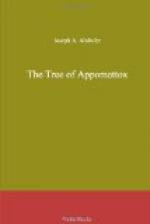“Madame!” repeated Dick, still embarrassed.
She lifted the fierce old eyes.
“I should think,” she said, “that the business of General Grant’s soldiers was to fight those of General Lee rather than to annoy lone women.”
Dick flushed, but angry blood leaped in his veins.
“Pardon me, madame,” he said, “but we have not come here to annoy a woman. We were fired upon from this house. The man who did it has had no opportunity to escape, and I’m sure that he’s still concealed within these walls.”
“Seek and ye shall—not find,” she half quoted.
“I must search the house.”
“Proceed.”
“First question her,” the sergeant whispered in the young lieutenant’s ear.
Dick nodded.
“Pardon me, madame,” he said, “but I must obtain information from you. This is war, you know.”
“I have had many rude reminders that it is so.”
“Where is your husband?”
She pointed upward.
“Forgive me,” said Dick impulsively. “I did not intend to recall a grief.”
“Don’t worry. You and your comrades will never intrude upon him there.”
“Perhaps you have sons here in this house?”
“I have three, but they are not here.”
“Where are they?”
“One fell with Jackson at Chancellorsville. It was a glorious death, but he is not dead to me. I shall always see him, as he was when he went away, a tall, strong man with brown hair and blue eyes. Another fell in Pickett’s charge at Gettysburg. They told me that his body lay across one of the Union guns on Cemetery Hill. That, too, was a glorious death, and like his brother he shall live for me as long as I live. The third is alive and with Lee.”
She had stopped knitting, but now she resumed it, and, during another embarrassed pause, the click, click of the needles was the only sound heard in the room.
“I regret it, madame,” resumed Dick, “but we must search the house thoroughly.”
“Proceed,” she said again in that tone of finality.
“Take the men and look carefully through every room,” said Dick to the sergeant. “I will remain here.”
Whitley and the troopers withdrew quietly. When the last of them had disappeared he walked to one of the windows and looked out. He saw his mounted men beyond the rose garden on guard, and he knew that they were as vigilant on the other sides of the house. The sharpshooter could not escape, and he was firmly resolved not to go without him. Yet his conscience hurt him. It was hard, too, to wait there, while the woman said not a word, but knitted on as placidly as if he did not exist.
“Madame,” he said at last, “I pray that you do not regard this as an intrusion. The uses of war are hard. We must search. No one can regret it more than I do, in particular since I am really a Southerner myself, a Kentuckian.”




